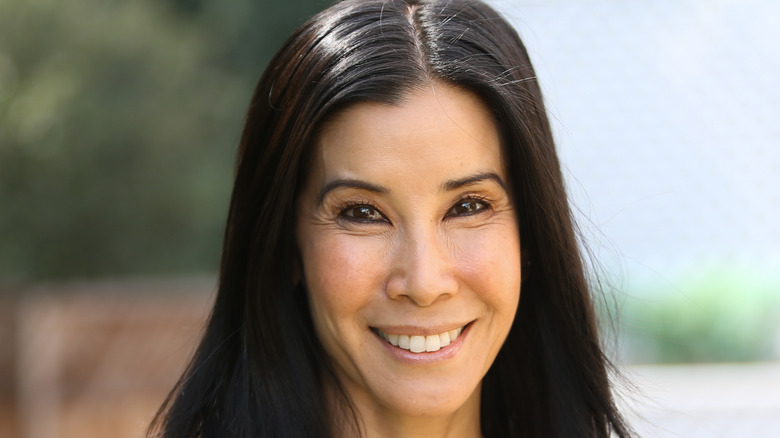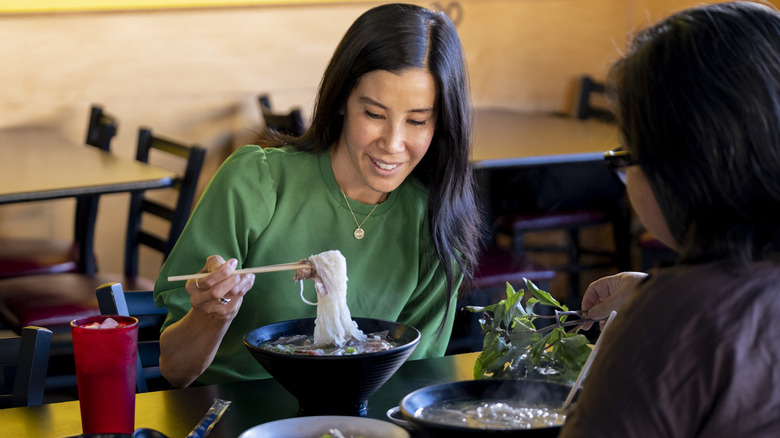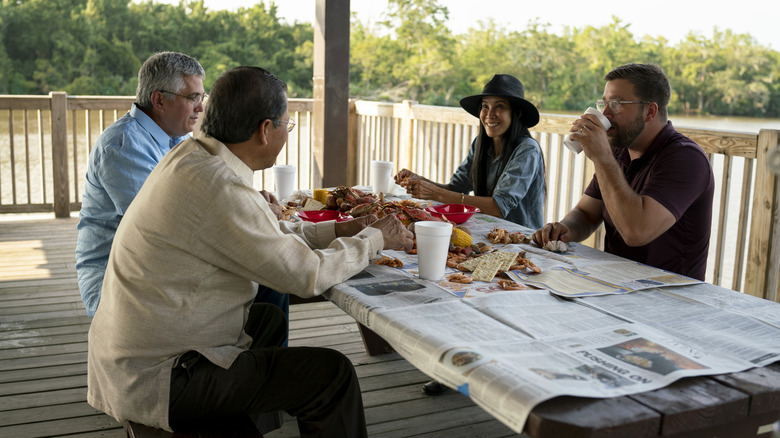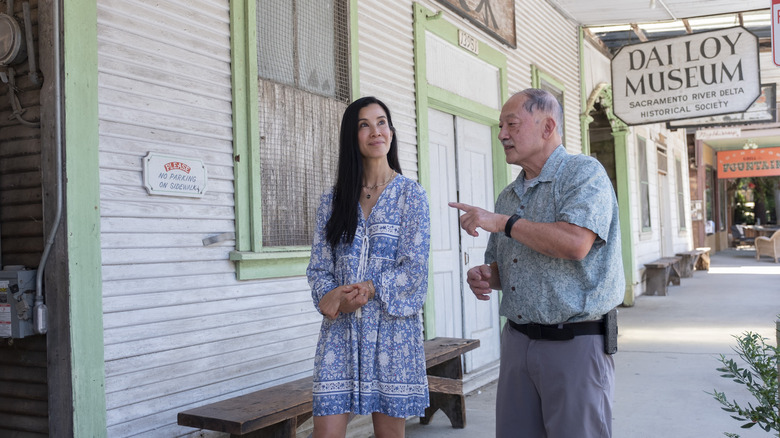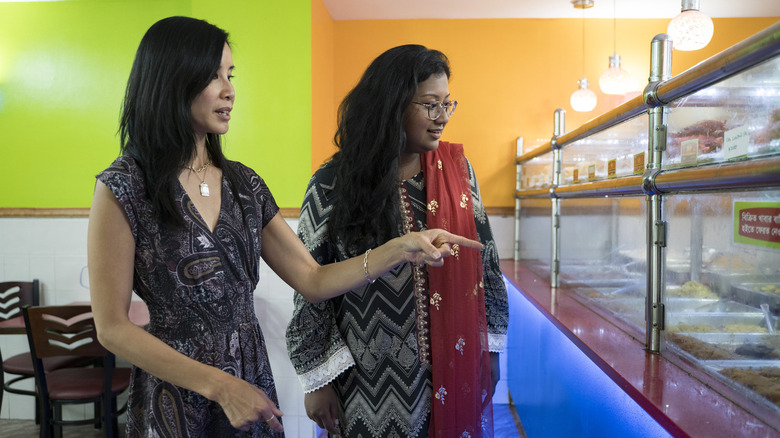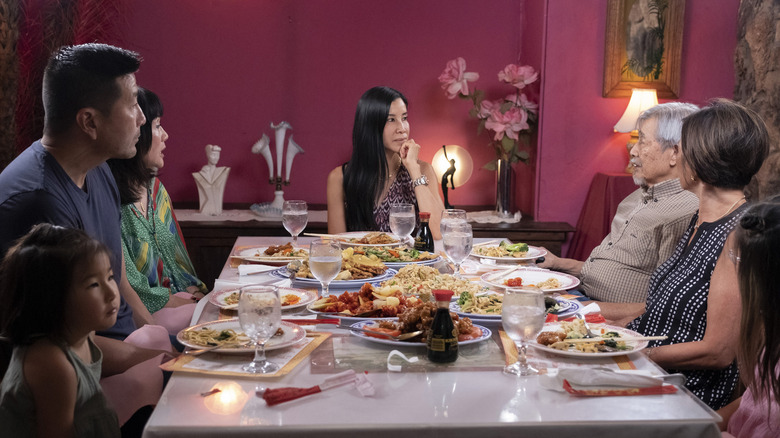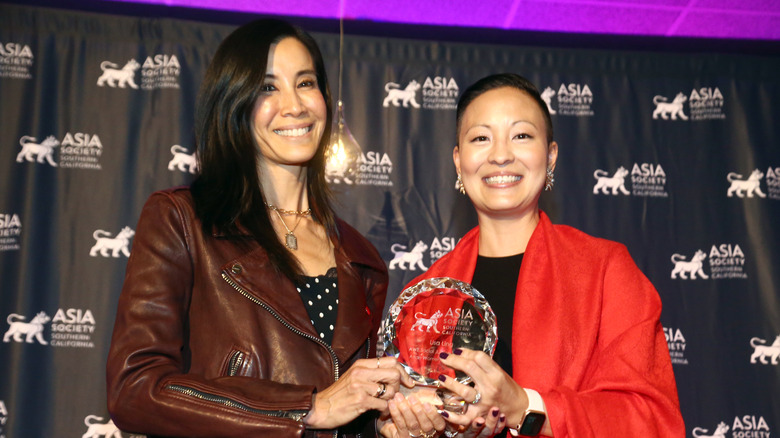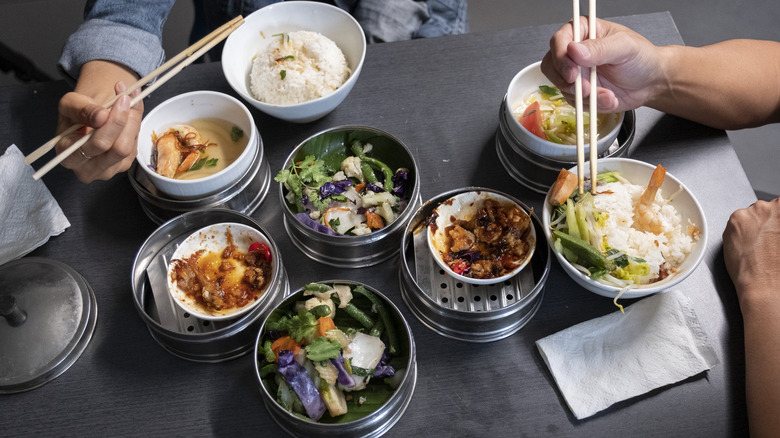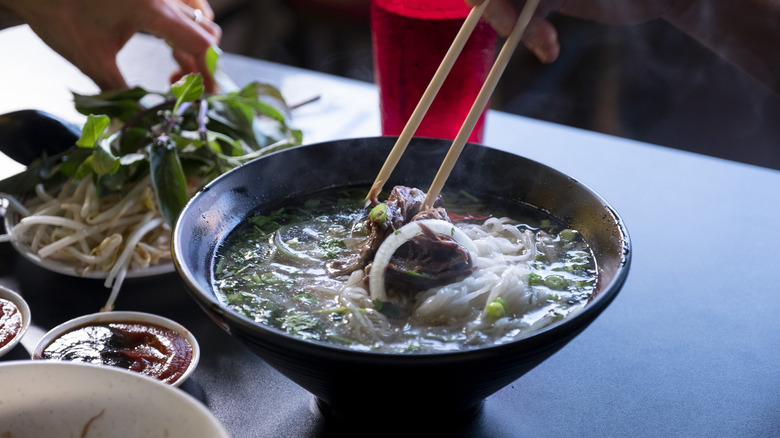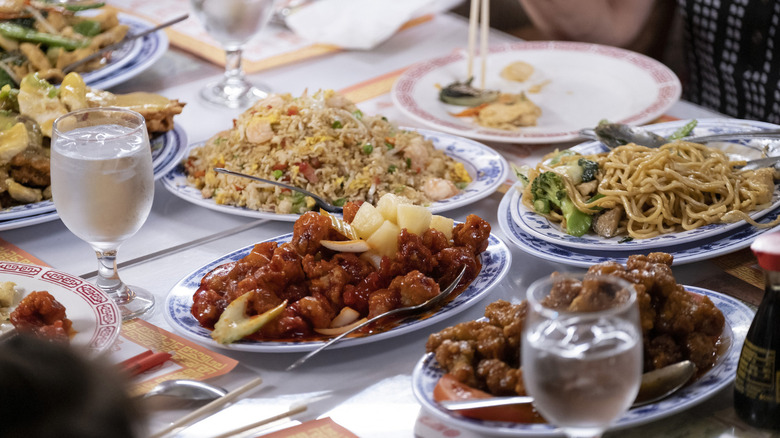Lisa Ling And Helen Cho Share Important Stories And Traditions On Take Out - Exclusive Interview
Lisa Ling is a well-known journalist recognized for her work on a long list of televisions shows. Ling is the host and executive producer of CNN's "This is Life with Lisa Ling," as well as the previous host of "Our America" and "The View," among others. Now, she's teamed up with director and producer Helen Cho, who has worked on shows such as "United Shades of America" and "Anthony Bourdain: Parts Unknown," for an all-new series: "Take Out with Lisa Ling."
Premiering on HBO Max on January 27, the new show shines an overdue light on Asian American contributions across the United States. Ling takes viewers on a journey to highlight Asian American culture and history, and it's all done through the lens of food.
What was the inspiration behind the show, and what can viewers expect? We sought to find out. In an exclusive interview with Mashed, Lisa Ling and Helen Cho talked all about their desire to share the story behind Asian foods and restaurateurs, all while offering a rich experience along the way.
Lisa Ling opens up about the original inspiration behind her show Take Out
What was the inspiration behind "Take Out with Lisa Ling?"
Lisa Ling: It's interesting because Asian restaurants, particularly Chinese restaurants, have become more ubiquitous than McDonald's. In big towns and small towns, you will likely find a Chinese restaurant, and these days, you might even find a Korean restaurant, or a Nepali restaurant, or a Bangladeshi restaurant. Yet there have been no shows that highlight the Asian American experience. Helen is Korean American. I'm Chinese American. We have more in common with one another than I do with anyone from China and that Helen does with anyone from Korea. It's a unique experience, and this opportunity to highlight Asian American culture and history through the lens of food that everyone loves was really the inspiration. It's just been so exciting to be able to do this kind of a project.
Why shining a light on Asian American culture was so important
Why was it crucial for you to shine a light on Asian American culture with this series?
Ling: Ironically, this show was greenlit by HBO Max before COVID and before this recent spate of attacks on Asian people. In light of those things, I think it's become more important than ever to highlight these kinds of stories because, let's face it, Asian American history is not taught in schools. When you exclude an entire community from your education and your history books, it becomes so easy to overlook and even dehumanize an entire population. I do think, or I would like to think, that people might be curious about how and why this food from this far away region has become so ubiquitous. Everyone loves Asian food but hasn't really taken the time to get to know the stories behind those foods.
Helen Cho: I think, as an Asian American, I've always felt in the way that Asian Americans have been portrayed in media as this perpetual foreigner. Through filming this series, it's incredible how deep and far back the history of Asian Americans [goes] in this country and [their] contributions to this country. We felt that it was important to highlight that and food is the perfect vehicle as a jumping-off point to get into those stories.
Ling: Helen mentions media portrayals. The truth of the matter is, never in our wildest dreams did we ever think that we would be able to do a show that highlights Asian culture and Asian food because past media depictions of Asians, up until very recently, were really ugly and peripheral. For so long, we just didn't even think that it could be a possibility.
Why did you choose to use food as the lens?
Ling: Well, everyone loves Asian food. Right? I mean, food, it transcends struggle. It transcends gender. It transcends culture and ethnicity. To me, there's this diplomatic role that food can play in our lives of bringing us closer and connecting us through cultures. I can't think of anything that could allow us better entry into culture than food.
Cho: Again, who doesn't love Asian food, and like she said, it's so ubiquitous in this country. I think, despite a lot of the prejudice and violent history in this country towards Asians, it's absolutely incredible that something like Chinese food, for example, is more ubiquitous than McDonald's in this country. Also, I think it was important for us to highlight that Asian Americans have so often been lumped into one category. We only have six episodes. We are very intentional that it wasn't just East Asians that we're including in the series, but also South Asian. There is a great diplomacy through food. It's something that is such an easy entry point into really human stories. Who doesn't love to eat? I think it's just an entry point.
The important lessons that can be learned from Take Out
What's one important lesson, or several important lessons, that you hope to teach others through the show?
Ling: I really would love for people to know more about the Asian American roots in America. Asians have been crucial in the development. Asian labor has been crucial in the development of this country, but yet there has been so much discrimination that the community has dealt with for over a century. I hope that people prepare themselves to have an illuminating experience, have a really fun time, and be exposed to some delicious foods. We only had six episodes. I tried to convince HBO max to give us 20, but they only agreed to six, but I can guarantee that every episode has its identity, and that was by design. You will experience a rollercoaster of emotions. You will laugh, you might cry, and you'll learn something from watching each of the episodes. I hope people are prepared to have a very rich experience.
Ling shares the most delicious food she was introduced to
What was one of the standout, most delicious dishes that you were introduced to on the show?
Ling: Oh my gosh. I had never had Bangladeshi food before and I was shocked to learn [about it], because in some ways, this has been a tremendous learning experience for me as well, that so many of the Indian restaurants in New York City and the surrounding boroughs are run by Bangladeshi people. Getting a chance to experience actual Bangladeshi food and also acknowledge that Bangladeshi's play such important roles in life in New York City was really illuminating for me. Bangladesh is known as a country of rivers. The food is extraordinary and very, very different from Indian food.
It's illuminating to show people that Bangladeshi is lumped with Indian food all the time. I think that maybe it's just easier to say Indian, but it's a different category itself.
Ling: It's totally different. In fact, one of the restaurants we feature, Korai Kitchen, they got Yelp to make a category for Bangladeshi food. Yelp didn't even have that category.
Lisa Ling and Helen Cho on growing up Asian American
You've said before, growing up, you were ashamed of your ethnicity. How do you hope to change that for other Asian Americans watching this show?
Ling: Well, because [while] growing up in America, we aren't exposed to Asian American history, it's almost like you don't have a frame of reference for your culture. How can you be proud of it if everything that you've seen is negative in the media? Asians have been depicted as buffoons throughout the history of media. How can you feel proud of being a part of a culture like that? What I hope with our series is that people will watch this and feel proud of the efforts, of the struggles, but also the triumphs and the achievements and the resiliency of this community.
Helen, is that something that you experienced as well, not feeling like you were represented?
Cho: I don't know if I would say I was ashamed, but I think I certainly did not feel seen, and this was something that was really important to us on this series. We intentionally built a team of majority Asian American creatives. I think who is pointing the lens at you is so important. It was amazing that some of the guests that we spoke with after the scene, you had these conversations that I never felt comfortable to share our stories. Seeing this Asian American creative team with such care and nuance and sensitivity to these stories really mattered to them. I really do believe that you'll see that in each of the episodes. You'll see those results. I really want this series to also be experimental and artful and not just educational. I hope that you get educated by watching this series, with all those things, but be entertained.
[During] each of the episodes, our team was referencing Asian American references or Asian films and art. Time and time again, a lot of the members were like, "I'm usually the only Asian American person on the team," and it was so empowering to feel seen and feel this solidarity as a crew. Also, with Lisa, working in this industry for so long and being the icon that she is, every conversation that we would have, even when the cameras were off and we were in our hotel room [or] in the lobby or something, having these conversations, really processing the conversations that we were capturing, but really just sharing what it's like being Asian American working in this industry. I think that representation is so important not just in front of the camera but behind the camera as well.
Forging a deeper connection to roots
Ling: We would literally, after our shoots, be like, "Are we really doing this? Is this really happening?" Helen, as the showrunner, it was so important for her to hire Asian American directors to navigate these episodes and incorporate their own experiences in some ways into these episodes. When you watch them all, each one of them has its own identity. They're so distinctive and special. For all of us to be able to work with one other Asian American on a crew, let alone an almost entirely Asian American crew, was just unprecedented for all of us.
Cho: [It wasn't] just like we had a field team, a majority of Asian Americans, but it was a very inclusive crew. It wasn't just Asian Americans. Our ACU was this wonderful Columbian woman. Our colorist is a Vietnamese American person. It was really important that we're looking at this in a very holistic way and that our production is not extractive but building upon real relationships. I think I can say without a doubt that our crew really developed a strong bond, and I think what we're missing right now is being together, and I think that was really unique and so empowering and really special.
It sounds like it was an enlightening experience for you all individually, but also as a group. Lisa, you've mentioned that you felt more connected to your roots than ever doing this show, and having the ability to allow other Asian American creatives to do that as well was beneficial in a collective way.
Ling: I've worked with incredible people throughout my lengthy career in TV. I have been working in this business for a long time and worked with sensational people. This experience was really unique, in that everybody involved just really recognized the unprecedentedness of it and just took it seriously in a way that was very different than experiences that we've had on other projects.
Cho: It was very personal to all of us. This is my first time show running and kudos to Lisa, Part 2 Pictures, and HBO Max for giving me that opportunity. I think I would definitely challenge other showrunners now being in this position to really seek out and diversify those on your staff, because, I think, in the end in our team, there were producers who had never directed, first-time directors or people who had worked on a feature documentary who had never directed a TV before. I do think that because everybody was so emotionally and personally invested in this project, that the product and the series is better for it.
Helen Cho shares how Anthony Bourdain prepared her as a showrunner
This was your first time as showrunner after previously working on "Parts Unknown." How did that prepare you for your first showrunner role?
Cho: When I think about working on a show like "Parts Unknown," or working with Tony, undoubtedly, it is part of my DNA. I think you can see pieces of that and inspiration of that in this series. I very intentionally wanted this not to be "Parts Unknown." This is very much its own thing and centering Asian Americans. One of the things that I looked at [with] "Parts Unknown" is, I had a lot of fun, and we had a lot of trust and leeway in experimenting, and I really wanted to bring those aspects into this series, as well. It's like, if we want to reference the scent of green papaya, like maybe nobody else will get those references, but our team will get those references, and that's okay.
Or if we wanted to break out into a karaoke video in the middle of a scene, why not? I think I wanted to challenge, in talking to all the directors and producers and our camera teams and creative teams, I wanted to challenge them to say this is our shot at doing this. I want you to be able to play with those things and experiment, and every episode feel like its own film and have its own distinct style, and tone, and pace. I really think that was very much something that we did a lot in "Parts Unknown." For me, it was really important that this series be very centering Asian American, the perspective, and including Asian American musicians and artists. I think that's how I look at the continuation of that legacy.
Favorite family traditions relating to food
Do you have a favorite family tradition that relates to food?
Ling: We do hot pot around New Year, like Chinese style hot pot. We do Chinese style hot pot around Chinese New Year or Lunar New Year, and then we do Korean Miyeok-guk, which is the seaweed soup, around American New Year. Around that time, January and February, we have a lot of really good food.
Cho: It's actually similar. I'm Korean American and so on New Year's, Lunar New Year, we would have Tteokguk which is a soup that you typically eat on New Year's and on birthdays, definitely Miyeok-guk is a must. It's like the seaweed soup, but those are our traditions.
Ling: I'm Chinese American. My husband's Korean American, and both of our daughters had the Dol, which is the first birthday, where we all dress in our hanboks. They would put out a scroll or money or a gavel, and these things would determine the child's future. The baby, at one, would crawl to, or walk, if you were a precocious one-year-old to grab one of those items, and whatever the child grabbed would foreshadow what they were going to do in their future. Both of my kids chose the pen, which I guess means they're going to be scholars or writers.
Lisa Ling and Helen Cho name their favorite kitchen ingredients and chefs
What is one ingredient that you can't live without when you're cooking?
Ling: I'm a hot sauce junkie. If you look, a whole side of my refrigerator, it's all different kinds of hot sauces. I can't say one in particular because I have a different hot sauce for different dishes.
Cho: That's a great question. I've been cooking a lot of Korean food at home ... the staples in my house, you've got to have doenjang and gochujang, which is like a red pepper paste for soups.
Who is one chef that you'd love to have cook you dinner?
Ling: Oh, that's a tough one. I guess I'd say Jon Yao who owns this restaurant here in L.A. called Kato. Jon Yao. He's only 27 years old.
Cho: Man, that's a tough one. I would say, to bring it back to "Takeout," I would absolutely love for Cristina Quackenbush and Roni Dacula to come to my house and host a dinner. That would be a dream.
Ling: Oh yeah. Can I be invited?
The whole cast and crew.
Cho: Everyone. Bring them all.
For more from Lisa Ling and Helen Cho, subscribe to HBO Max and watch "Take Out with Lisa Ling," which premieres on January 27.
